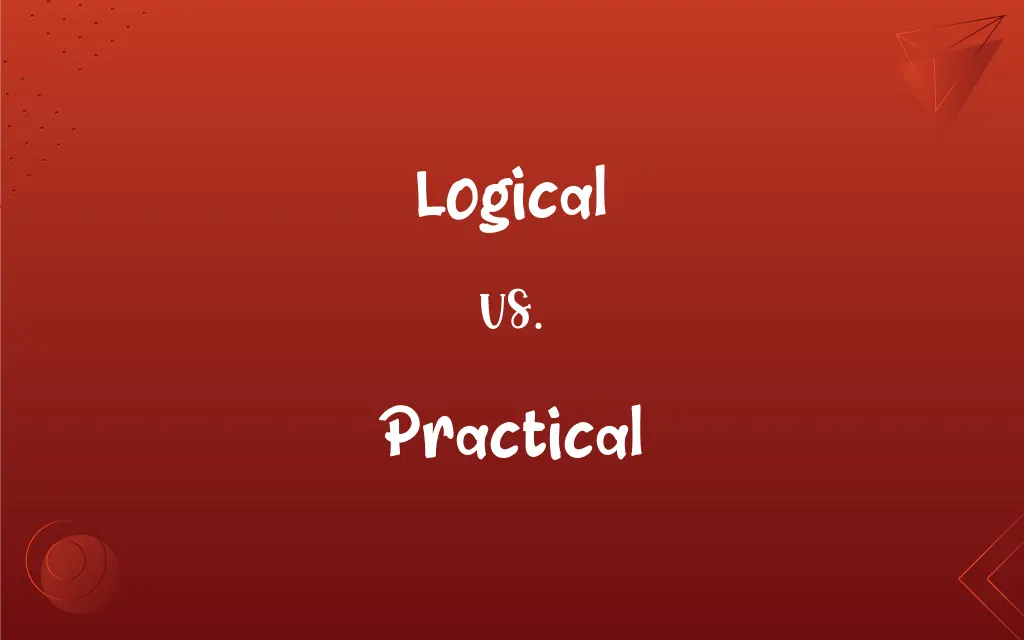Logical vs. Practical: What's the Difference?
Edited by Janet White || By Harlon Moss || Published on November 29, 2023
Logical pertains to formal reasoning; practical relates to real-world application or feasibility.

Key Differences
Logical thinking refers to the use of structured reasoning to come to a conclusion. It involves a systematic process of thinking where conclusions follow from premises according to the rules of logic. For example, if all mammals breathe air, and a whale is a mammal, then it is logical to conclude that whales breathe air. Practical thinking, on the other hand, is concerned with the actual practice or application of an idea, focusing on what is effective or actionable in real-life situations. So, while it’s logical to conclude that whales breathe air, it's practical to consider how this fact affects their behavior and habitat.
The logical approach is often theoretical, relying on data, models, and deductive reasoning to arrive at a conclusion. Logical reasoning is essential in fields that require critical thinking, such as mathematics and philosophy, where principles and arguments must follow a coherent pattern. Practical thinking is more experiential and often empirical, concerned with the workability of solutions or ideas in actual scenarios. For instance, a practical person may prioritize a solution that is viable and cost-effective over one that is theoretically perfect but difficult to implement.
A logical argument may not always lead to a practical solution, as logical validity does not guarantee effectiveness in the real world. An argument that is logically sound is one where the conclusion necessarily follows from the premises. However, a practical argument evaluates the applicability and practicability of the conclusion, considering constraints such as resources, time, and context. While logical correctness is an absolute concept, practicality can vary according to the specific conditions and requirements of a situation.
The realm of logic values consistency, non-contradiction, and formality. Logical correctness is judged independently of the observer’s beliefs or the subject matter's utility. In contrast, practicality values utility, efficiency, and feasibility. Practical solutions are often judged based on their results and ease of implementation, taking into account human needs and limitations. Therefore, while logical statements are evaluated for their intrinsic coherence, practical statements are evaluated for their extrinsic effectiveness.
In the field of computer science, logical processes refer to the computational and algorithmic foundations that underpin software and hardware operations. Everything in computing must follow strict logical rules to function. In the same field, practical considerations might focus on user interface design, where the usability and efficiency for the end-user are paramount. What is logical in code may not always be the most practical in terms of user experience.
ADVERTISEMENT
Comparison Chart
Nature
Abstract reasoning and validity
Real-world functionality and application
Basis
Deductive reasoning, principles
Empirical evidence, experience
Aim
To achieve consistency and correctness
To achieve utility and workability
Use in Language
Describes sound reasoning
Describes effective action or approach
Field Examples
Mathematics, Philosophy
Engineering, Everyday problem-solving
ADVERTISEMENT
Logical and Practical Definitions
Logical
Of or pertaining to the science of logic.
Her approach was logical, prioritizing clear evidence over emotions.
Practical
Concerned with actual use or practice.
His practical knowledge of carpentry made him an excellent builder.
Logical
Reasoning conducted according to strict principles of validity.
He made a logical argument that everyone quickly understood.
Practical
Suited to real-world conditions or use.
She always gave practical advice that was easy to implement.
Logical
Characterized by or capable of clear, sound reasoning.
The logical conclusion was that the butler had not committed the crime.
Practical
Focused on the practicality of results.
We need a practical solution that fits our budget, not a fancy one.
Logical
Capable of clear, sound reasoning.
It's only logical to save money before making a large purchase.
Practical
Having or put to a practical purpose or use.
The workshop was practical for the artisans to create their crafts.
Logical
Systematically arranged and coherent.
The textbook was well-organized, presenting the information in a logical manner.
Practical
Of, involving, or concerned with experience or actual use; not theoretical.
His approach to teaching science was very practical, with lots of experiments.
Logical
Of, relating to, in accordance with, or of the nature of logic
Logical disputation.
Practical
Of, relating to, governed by, or acquired through practice or action, rather than theory or speculation
Gained practical experience of sailing as a deck hand.
Logical
Based on earlier or otherwise known statements, events, or conditions; reasonable
Rain was a logical expectation, given the time of year.
Practical
Manifested in or involving practice
Practical applications of calculus.
FAQs
What does logical mean?
Logical refers to clear, rational reasoning or the formal process of inference.
Can something be practical but not logical?
Yes, sometimes a practical solution works in practice without following logical reasoning.
Is logical thinking important in decision-making?
Logical thinking is crucial for making decisions based on reason and evidence.
Can something be logical but not practical?
Yes, an idea can be logical in theory but not practical to implement.
What is a logical fallacy?
A logical fallacy is an error in reasoning that undermines the logic of an argument.
How do you use logical in a sentence?
"Her logical approach to the problem helped us find a solution quickly."
How do you use practical in a sentence?
"He has a lot of practical experience in plumbing and fixed the issue easily."
Are logical conclusions always correct?
Logical conclusions are correct if they are based on valid premises and sound reasoning.
How does one improve logical thinking?
Studying logic, practicing problem-solving, and engaging in structured debates can improve logical thinking.
Is logic the same as common sense?
Logic is a formal system of reasoning, while common sense is intuitive understanding; they overlap but are not identical.
Is being practical important in everyday life?
Being practical is important for dealing with daily tasks and real-world problems effectively.
Are practical methods always efficient?
Practical methods are typically efficient, but not always the most efficient possible.
Do practical skills help in theoretical fields?
Practical skills can provide insights into applying theories effectively in real-world contexts.
Can practicality be taught?
Yes, practicality can be taught through experiential learning and applying knowledge to practical tasks.
What does practical mean?
Practical refers to what is sensible or useful in real-world situations.
Do logical skills help in practical situations?
Logical skills can help in practical situations, especially when complex problem-solving is required.
What is a logical argument?
A logical argument is a series of statements systematically connected to arrive at a valid conclusion.
What is a practical skill?
A practical skill is an ability learned through direct experience that is useful for specific tasks.
How does one become more practical?
Gaining hands-on experience and learning from real-life situations can make one more practical.
What is a practical approach?
A practical approach is a method that prioritizes effectiveness and feasibility in application.
About Author
Written by
Harlon MossHarlon is a seasoned quality moderator and accomplished content writer for Difference Wiki. An alumnus of the prestigious University of California, he earned his degree in Computer Science. Leveraging his academic background, Harlon brings a meticulous and informed perspective to his work, ensuring content accuracy and excellence.
Edited by
Janet WhiteJanet White has been an esteemed writer and blogger for Difference Wiki. Holding a Master's degree in Science and Medical Journalism from the prestigious Boston University, she has consistently demonstrated her expertise and passion for her field. When she's not immersed in her work, Janet relishes her time exercising, delving into a good book, and cherishing moments with friends and family.






































































